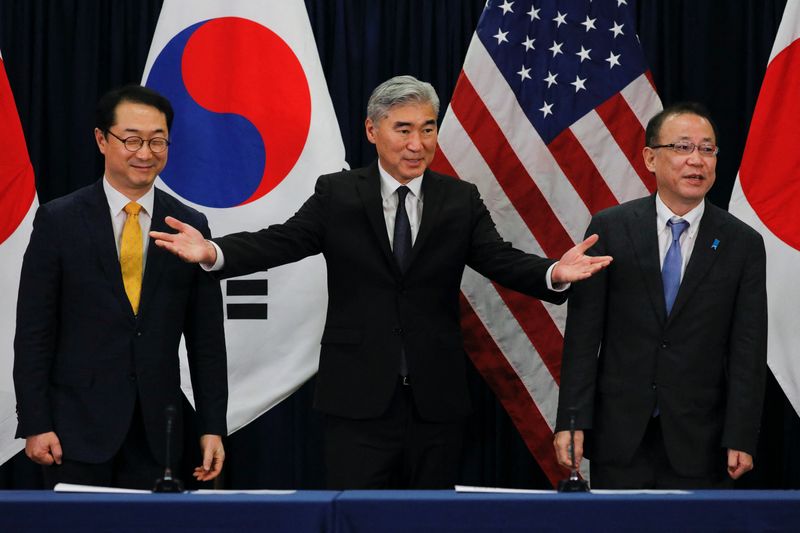By Stanley Widianto
JAKARTA (Reuters) - South Korea, Japan and the United States will coordinate sanctions and close gaps in the international sanctions regime against North Korea, Seoul's envoy for North Korea said on Tuesday.
Kim Gunn, South Korea's Special Representative for Korean Peninsula Peace and Security Affairs, said at a meeting in the Indonesian capital Jakarta with his U.S. and Japanese counterparts that North Korea was "becoming more aggressive and blatant in its nuclear threat".
"North Korea's further provocation will be met by a firm and united response from the international community," he said.
The three countries this month imposed more sanctions on North Korean officials connected to the country's weapons programmes after Pyongyang's intercontinental ballistic missile test.
The sanctions follow a Nov. 18 ICBM test by North Korea, part of a spate of more than 60 missile launches this year, and amid concerns that it may be about to resume nuclear weapons testing, which has been suspended since 2017.
Decades of U.S.-led sanctions have failed to halt North Korea's increasingly sophisticated missile and nuclear weapon programmes.
South Korea's Kim said China, North's Korea's closest ally, had the capability to influence Pyongyang and hoped Beijing would "continue to play a constructive role in this regard."
U.S. Special Representative for North Korea Sung Kim said at Tuesday's meeting in Jakarta that the behaviour of Pyongyang presented one of the most serious security challenges to the region and beyond.
"The DPRK presents challenges that can only be successfully addressed when the international community stands together and speaks with a unified voice," said Kim, using the initials of North Korea's official name, Democratic People's Republic of Korea.
Meanwhile, Japanese Ministry of Foreign Affairs Director General for Asian and Oceanian Affairs Bureau Funakoshi Takehiro said the three allies had elevated security cooperation to an unprecedented level.
He said the trio would examine all options including counter strike capabilities and be more vigilant against North Korea's cyber threat, while adding that the three countries would "remain open to dialogue" with Pyongyang.

Japan recently designated three entities and an individual for new sanctions, including the Lazarus Group suspected of carrying out cyberattacks.
China and Russia have blocked recent efforts to impose more United Nations sanctions, saying they should instead be eased to jumpstart talks and avoid humanitarian harm. That has left Washington to focus on its efforts with South Korea and Japan, as well as European partners.